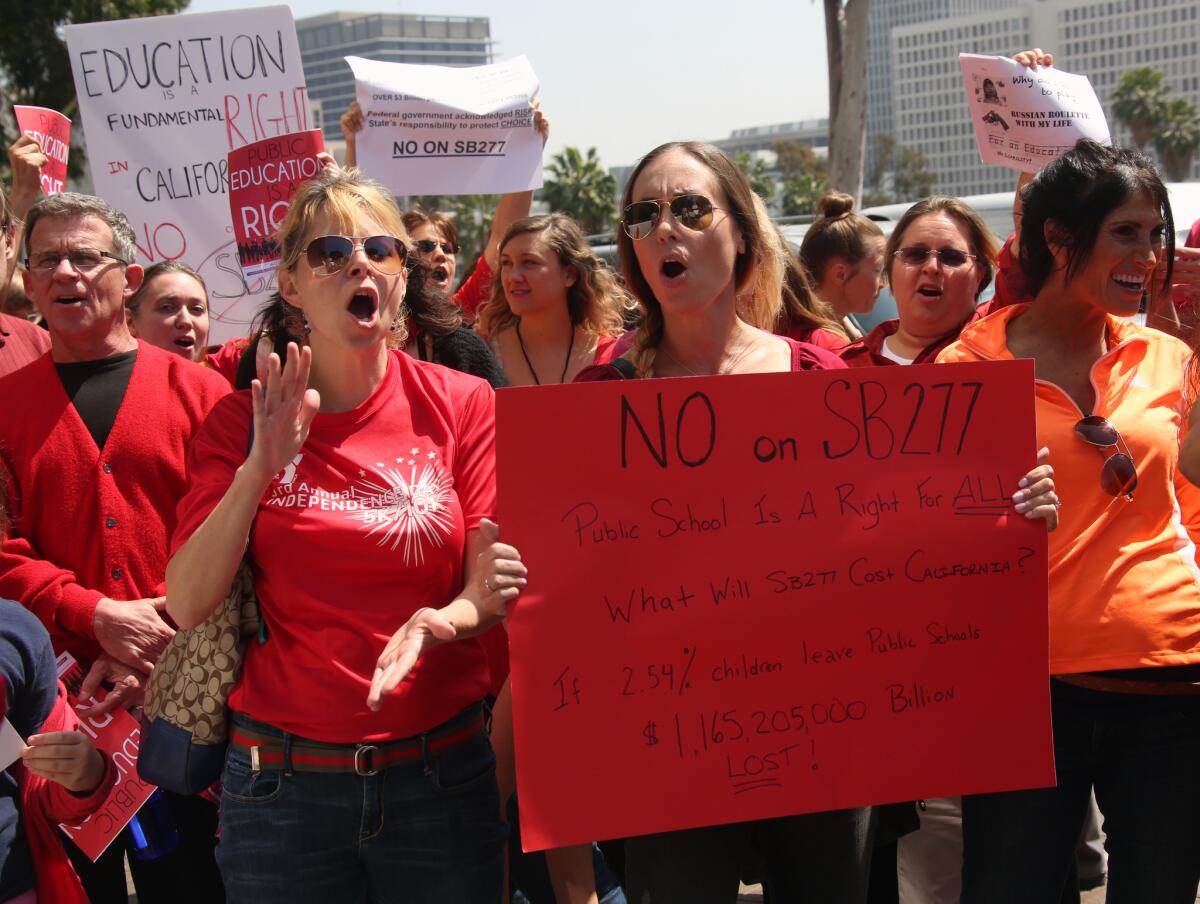Q&A: Could California’s proposed vaccine law be unconstitutional?

Parents and teachers who oppose efforts to end the personal belief exemption on vaccinations rally outside Los Angeles Unified School District headquarters on April 14.
- Share via
Could California’s proposed vaccine law, which would require more children to get vaccinated to enter daycare and school, be eventually ruled unconstitutional?
Some opponents to the bill, SB 277, think so. Here’s why.
Who is arguing that such a law is not constitutional?
One person doing so is Assemblyman Mike Gatto, a Democrat from Glendale. He accused the state of “infringing on the rights of certain students to attend school.”
What’s the constitutional argument based on?
There is a state constitutional right to a public education.
How does that compare with current state laws on vaccination?
All 50 states have laws requiring vaccination for schoolchildren. So the argument is really about how easy it is for a student to get exempted from a required vaccine.
So would a law requiring vaccines for school entry, with no exceptions except for medical reasons, be unconstitutional?
There are several strong arguments for why the law would be constitutional, UC Hastings College of the Law professor Dorit Rubinstein Reiss said.
- Health and safety is a compelling interest. This is not about denying access to a good, well-funded education to the poor, she said. “It’s saying: ‘We’re making the schools safer.’”
- Lower vaccination rates makes school less safe. What about the rights of children who can’t be vaccinated because they have leukemia and suffer from a weak immune system? “You’re making school less safe for those who don’t have a choice, can’t be vaccinated, can’t go to school.”
- Home schooling is an option. Schools don’t change their curriculum to satisfy parents’ religious objections. “It’s up to the parents if they want to follow the requirements… or choose the alternative of homeschooling,” she said.
How do other states handle vaccine laws?
Mississippi and West Virginia require vaccinations as a condition of school entry, and don’t allow philosophical or religious objections.
New York does not allow philosophical objections, but allows religious objections. Still, they can be tough to get. The state requires a parent to write a statement demonstrating “genuine and sincere religious beliefs” contrary to immunization. Schools that don’t believe the parent can reject those requests.
What have federal courts said about state vaccine laws?
In 1922, the U.S. Supreme Court upheld a city law requiring schoolchildren to get vaccines. “These ordinances confer not arbitrary power, but only that broad discretion required for the protection of the public health,” the court ruled in Zucht v. King.
In a 1944 ruling, the U.S. Supreme Court wrote in Prince v. Massachusetts that “the right to practice religion freedly does not include liberty to expose the community or the child to communicable disease or the latter to ill health or death.”
What about recently?
Parents in New York recently sued in federal court challenging the state’s requirement that all children be vaccinated to attend public school. The Second Circuit of the U.S. Court of Appeals in January ruled in Phillips vs. City of New York that the rules were “a constitutional permissible exercise of the state’s police power and do not infringe of the free exercise of religion.”
Are there any other avenues for opponents of the law to take if the bill is approved by the governor?
Opponents could seek to overturn the law by a popular vote during a statewide election.
What is public opinion on this issue?
A Public Policy Institute of California survey released in May said 67% of Californians say children should not be able to attend public schools unless they are vaccinated.
Follow me on Twitter for more California breaking news: @ronlin
More to Read
Sign up for Essential California
The most important California stories and recommendations in your inbox every morning.
You may occasionally receive promotional content from the Los Angeles Times.










